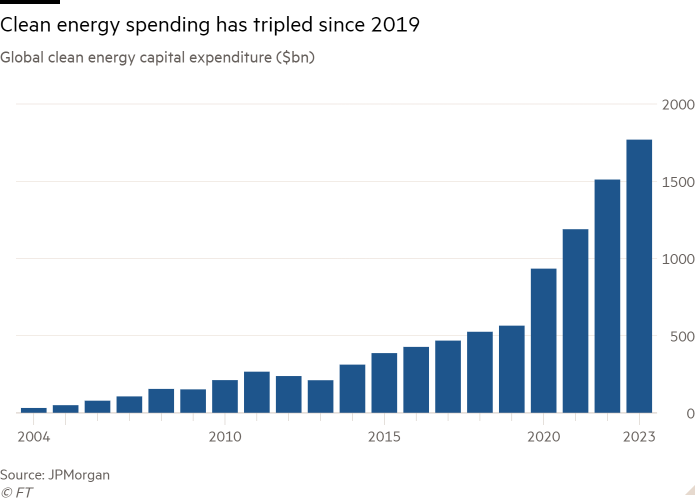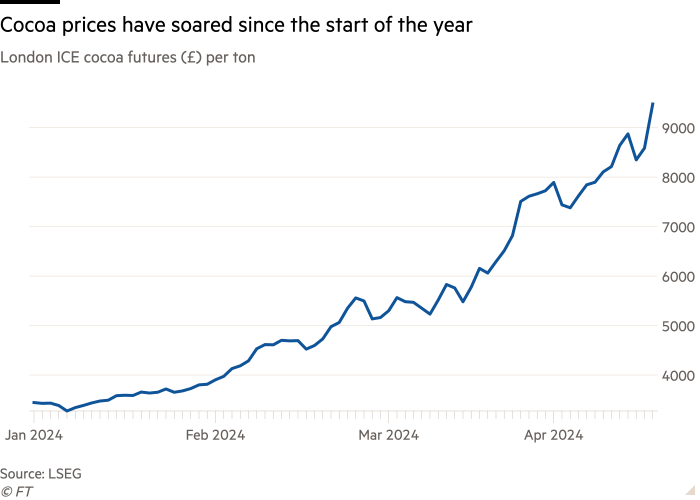Today’s top stories
For up-to-the-minute news updates, visit our live blog
Good evening.
Swings in oil prices from heightened tensions in the Middle East may serve as a useful reminder of the need for more secure (and greener) forms of energy, but as a flurry of news stories today highlights, that transition is proving more problematic than expected.
Some analysts suggests the muted market reaction to Israel’s strike on Iran shows increasing confidence that both sides want to avoid a full-blown conflict that chokes off the supply of oil, while others suggest markets may be underestimating the potential for escalation.
Either way, JPMorgan warns today that the world needs a “reality check” on the move away from fossil fuels. The US bank said efforts to cut back the use of coal, oil and gas had been hit by higher interest rates and inflation, as well as the wars in Ukraine and the Middle East.
“While the target to net zero is still some time away, we have to face up to the reality that the variables have changed,” its head of global energy strategy told the FT. The bank also pointed out that investment in renewable energy “currently offers subpar returns” and that if energy prices rose strongly, there was a risk of social unrest.

The level of investment required in clean energy is likely to put a brake on government ambitions, JPMorgan argues.
That was aptly illustrated yesterday by the Scottish government ditching its plans to cut greenhouse gas emissions by 75 per cent by 2030 from 1990 levels after the UK’s Climate Change Committee said the goal could not be met. It’s all a far cry from when Glasgow hosted the UNCOP26 summit in 2021 and then First Minister Nicola Sturgeon said Scotland could lead the world into a green revolution and “speed up our efforts to save the planet”.
The committee also said it had “low confidence” that the UK would meet its target of reducing emissions by 68 per cent over the same period after Prime Minister Rishi Sunak U-turned on key green measures.
The rest of Europe meanwhile is still finding it difficult to balance the needs of energy security with its desire to punish Russia for its invasion of Ukraine. Acer, the EU’s energy regulator, warned that the bloc still needed to import Russian liquefied natural gas to avoid an energy shock, even as Nordic and Baltic nations argued for an outright ban of purchases from Moscow.
Doubts have also been raised about the efficacy of Europe’s carbon trading schemes, with new data highlighting the limitations of one of the key tools to fight pollution from aviation. Less than a quarter of airline emissions were caught last year by the schemes, which require companies to buy allowances to cover the carbon dioxide they give off.
Oil companies meanwhile have trimmed back their climate targets, even after the hottest year ever recorded, while other big businesses have failed to set goals ambitious enough to be approved by the Science Based Targets initiative, a validation body set up after COP26.
Our story today on the struggles at Woodside, Australia’s largest oil and gas developer, to get its climate plans accepted by shareholders, is the latest example of an energy company facing criticism for not going far enough in setting binding targets.
Back in the Middle East, the power of oil remains as potent as ever. The FT has revealed that Iran is exporting more crude than at any time for the past six years, exposing the limits of US and EU attempts to raise the pressure on Tehran.
Need to know: UK and Europe economy
Former UK Prime Minister Boris Johnson breached UK government rules by failing to disclose his relationship with a hedge fund that organised his trip to meet Venezuelan president Nicolás Maduro, according to the business appointments watchdog.
The UK government has told port authorities that it will not “turn on” critical health and safety checks for EU imports when post-Brexit border controls begin later this month because they could cause delays. A new study says drug shortages in the UK more than doubled between 2020 and 2013 as Brexit “exacerbated” problems with supplies.
UK retail sales unexpectedly stagnated in March as shoppers cut back on groceries.
The US House of Representatives votes on Saturday evening on whether to send $60bn of additional aid to Ukraine. Ukrainians meanwhile are turning pessimistic. Former Nobel peace prize winner Oleksandra Matviichuk writes in the FT that the trapped US funds are the difference between life and death.
Need to know: global economy
Voting in India’s general election — the biggest in the world with nearly 1bn people registered to vote — began today and lasts more than six weeks. Prime Minister Narendra Modi is hoping to win another five-year term that will tighten his control over the country. If you want to know more, South Asia bureau chief editor John Reed picks out five books to understand India today.
Cocoa prices hit a record high after a report highlighted crop failures in west Africa, exacerbating the global shortage of beans for chocolate.

Our Borderlands series continues with a data-rich Big Read on which countries are the best and worst in Europe at integrating skilled migrants to their workforce and the economic cost of “brain waste”.
Panama, once Latin America’s star economy, is close to losing its investment-grade ratings status and with elections looming the next president is set to inherit the biggest economic challenge in decades. The IMF forecasts a dramatic slowdown in growth this year to 2.5 per cent from 7.5 per cent in 2023.
Need to know: business
Meta launched Llama 3, a less “sanctimonious” version of its artificial intelligence model which it said was a fresh step towards human-level intelligence including the ability to reason. Google is also speeding up its AI efforts.
Netflix profits surged thanks to its crackdown on password sharing but its shares fell after it said it would stop regularly publishing its subscriber numbers, a crucial benchmark for investors in the streaming era.
Taiwan Semiconductor Manufacturing Company said it planned to charge customers more for making their chips outside of Taiwan to keep up its profitability. The price increases come as governments and companies around the world try to mitigate geopolitical risks by securing additional chip supplies outside Taiwan, where more than 90 per cent of the world’s most advanced semiconductors are produced.
It: “What are you trying to do today?” Me: “Speak to a human being who cares.” It: “I’m sorry, I don’t understand.” Consumer editor Claer Barrett investigates how customer service got so bad.
Taylor Swift’s new album dropped with the usual thumbs-up from critics, but not without causing a few problems at streaming service Spotify.
Science round up
Record ocean warming has added to dangers facing marine life, including already dwindling native fish species, an EU environment chief has warned. It is estimated that about a third of the Mediterranean’s native marine species may shift to deeper, cooler waters, while more invasive species such as blue crab and lionfish thrive in the warmer environment.
A new study highlighted the potential of generative artificial intelligence to revolutionise medicine. Cambridge researchers found that OpenAI’s latest model was better than junior doctors at diagnosing eye problems.
Eli Lilly’s weight-loss drug tirzepatide, marketed under brands including Zepbound for weight loss and Mounjaro for diabetes, significantly reduced sleep apnoea in a late-stage clinical trial, adding to evidence that could encourage more insurers to cover the drug.
Claims that researchers at Google Deep Mind and elsewhere had created new chemical compounds using artificial intelligence appear to be overblown, writes Anjana Ahuja.
Forget the solar eclipse, the latest big show for American nature-watchers is cicada-geddon: a natural phenomenon that last happened when Thomas Jefferson was US president in 1803. It occurs when overlapping cycles of insects wake from their slumbers to climb into the trees and have sex. “It will be like having a National Geographic special in your backyard: people will see birth, death and wild sex in the treetops,” said one entomologist.
Some good news
The Criterion Theatre in London’s West End is celebrating its 150th birthday by distributing 150 tickets every week for eight weeks from next Monday to those aged 12 to 21 years old.
Thanks for reading Disrupted Times. If this newsletter has been forwarded to you, please sign up here to receive future issues. And please share your feedback with us at disruptedtimes@ft.com. Thank you



